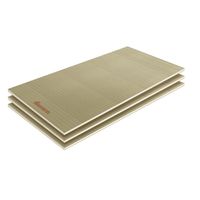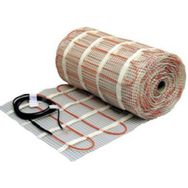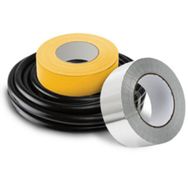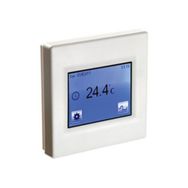Insulation Boards
Insulation boards (also known as insulation sheets) are a great energy-saving measure and offer high-performance insulation. All underfloor heating systems can benefit from extra insulation boards for optimum energy output.
Thermal insulation boards are an affordable way to reduce any heat loss from your home and can lower heating-up time, reducing heating bills.
At YESSS Electrical, we supply underfloor heating insulation boards in a range of sizes and thicknesses to suit any project.
Shop from our extensive range below.
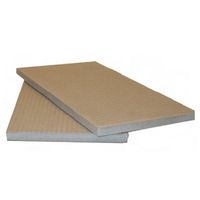
6mm x 0.75m² Insulated Tile Backer Board
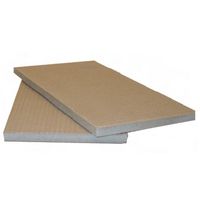
10mm x 0.75m² Insulated Tile Backer Board
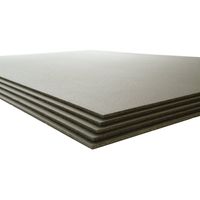
ECOMAX-LITE Thermal Insulation (500mm x 1000mm) - 5m²
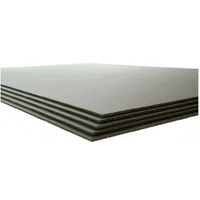
ECOMAX-LITE Thermal Insulation, 500mm x 1000mm, 18m²

ECOMAX-LITE Thermal Insulation, 500mm x 1000mm, 3m²
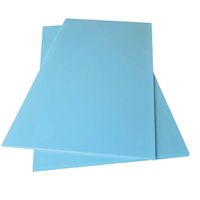
6mm Ecomax-XPS Uncoated Insulation Board (600mm x 1200mm)
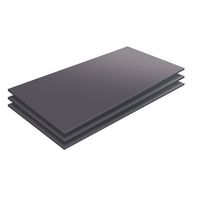
XPS Premium Insulation Board, 1200mm x 600mm x 10mm, 0.72m²
FAQs
What are insulation boards and what are their main benefits?
Insulation boards are rigid substrate panels made from various insulating materials, such as foam plastics, polystyrene or mineral wool. They're designed to improve the thermal efficiency of buildings by reducing heat loss and energy consumption.
Installing rigid insulation boards can result in lower energy bills, increased comfort and reduced environmental impact through decreased carbon emissions. Insulation foam boards can be installed in homes and under commercial flooring to help reduce noise pollution and improve thermal performance. Constructed from rigid material and manufactured into sheets, rigid insulation board is available in a range of different materials.
What materials are insulation boards made of?
We offer a wide range of insulation panels made from different materials, with insulation properties suitable for various uses.
Expanded Polystyrene (EPS) boards
EPS boards are made from a foam-like material and are a lightweight option.
Extruded Polystyrene foam (XPS) boards
XPS offer high compressive strength and moisture resistance due to their being made up of closed-cell foam.
PIR insulation board (polyisocyanurate)
PIR insulation boards are used for their fire-resistant properties and insulating efficiency.
Can insulation boards help with noise reduction?
Insulation boards are naturally sound-absorbing and can help to reduce noise between walls, floors, ceilings and rooms. Materials like foam are excellent at absorbing soundwaves and are an effective choice in both domestic and commercial settings where reducing noise transmission is preferred.
How can I tell if my insulation boards are working effectively?
The key things to look out for to check the effectiveness of your insulation board installation include temperature, energy efficiency and sound absorption. For example, a consistent temperature is a good indicator that the boards are minimising heat loss and lower energy bills thanks to low thermal conductivity. Effective insulation will also absorb sound from outside the property and between rooms, so it is likely you'll notice a quieter space if your insulation boards are correctly installed.
Where can I install insulation boards?
Insulation boards can be installed in walls, floors and roofs. Floor and wall insulation boards are especially useful for sound-absorption, while roof insulation boards tend to provide extra moisture resistance and heat retention, and can bear heavier loads.
Are insulation boards waterproof?
Insulation boards are not necessarily 'waterproof', but do offer moisture-resistant properties. Extruded Polystyrene (XPS) and Polyisocyanurate (Polyiso) in particular are renowned for their water repelling properties while still offering breathability to manage humidity between layers of insulation board and walls.
How do I choose the right insulation board for my needs?
When selecting rigid foam insulation boards, consider factors such as the desired thermal conductivity performance, the location and type of installation and budget. It's also essential to choose the appropriate rigid foam board size and thickness to achieve the required insulation levels, and note that some products are not suitable to be installed below timber floors.
Can I install rigid panel insulation boards myself, or do I need a professional?
While some insulation boards can be installed by a knowledgeable DIY enthusiast, we recommend consulting with a qualified professional to ensure proper installation, compliance with local regulations, and optimal performance.
Installing insulation boards improperly can lead to reduced insulation effectiveness and potential issues with moisture or condensation.
How do I maintain insulation boards?
Insulation boards typically require minimal maintenance once they are correctly installed. However, it's essential to periodically check for any signs of damage, dampness, or pest infestation and address these issues promptly to maintain the boards' effectiveness.
Are insulation boards safe to use with underfloor heating systems?
Yes, insulation boards are compatible with most underfloor heating systems when installed correctly. They can enhance the efficiency of your heating system by reducing heat loss through the floor. Always follow the manufacturer's guidelines and consult with a professional installer to ensure compatibility and proper installation.
What is the lifespan of insulation boards?
When installed and maintained correctly, insulation boards can last for several decades. The lifespan of insulation boards can be affected by factors such as the type of material used, the quality of installation, and the environmental conditions in which they are installed.
How do I determine the appropriate thickness for my thermal insulation board?
The required thickness for your insulation board depends on factors such as the desired thermal performance and the specific building regulations that may apply to your project. Consult a qualified professional to determine the appropriate thickness of rigid insulation boards for your specific needs.
Shop insulation boards online today with free delivery, or visit your local YESSS store to shop in-person.


